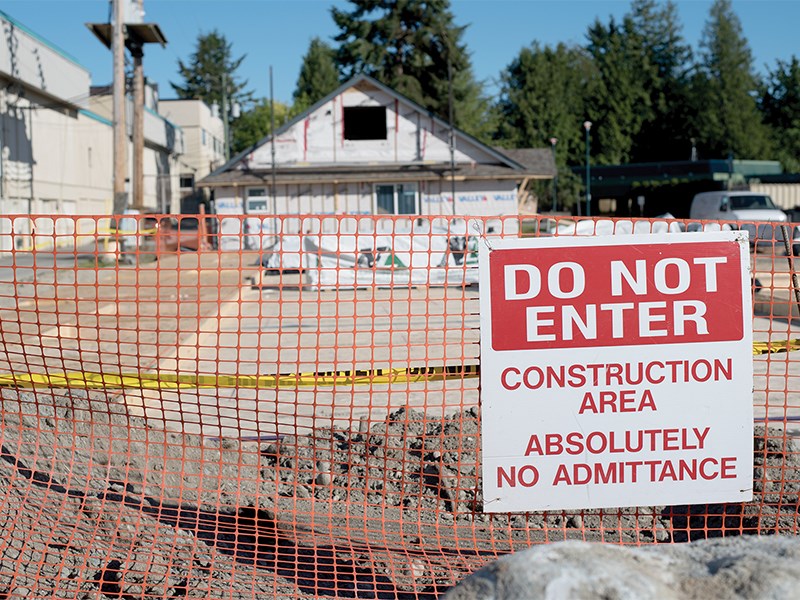At the halfway point of the year, 2017 is shaping up to be a banner year for development in Powell River, but the large number of new builds and regulations around them are making it difficult to find contractors.
The city saw approximately $15 million in new construction in 2016. According to city director of planning Thomas Knight, that total might double in 2017 due to an increasingly hot real estate market and demand for Powell River’s affordable land.
However, buying a lot and trying to find a builder is not easy, something many residents have found out the hard way. Builders are busy and wait times for contractors to start building new homes can be several months long.
Agius Builders principal Jim Agius said he has not seen this much activity in the local construction industry in the past 20 years.
“It’s really busy right now,” he said. “Housing inventory is low and home prices seem to be at the highest level we’ve ever seen.”
Aguis said he operates a stable, nine-person crew and would rather pass on jobs than expand and have to lay workers off when the work dries up.
“From our perspective, we’re just saying no to work,” he said. “I’m talking two or three times a week. Everyone is looking for renovations and there are a lot of newcomers coming to town and buying property.”
Complete Construction Services owner Troy Marshall said his contracting company is also working at capacity. He said if asked to start building a new house tomorrow it would probably take three or four months before his crew could even start on a project. For the average home, builds take between four and five months.
“You’re eight months down the road before your house is done, and that’s with the delays we have as builders because we’re so busy,” he said.
Marshall said he blames the added bureaucracy of the provincial government’s new home warranty regulations for making it more difficult for local builders to handle the volume of work.
In March 2016, the BC government brought in regulations through BC Housing requiring general contractors who build houses to meet a minimum qualification standard before being issued a licence. That licence allows builders to apply for third-party, new-home insurance for the build.
While that sounds like something that would improve the construction industry, Marshall said its effect has been a reduction in the number of builders who are able to construct homes.
Those same regulations also require Powell River landowners wishing to build their own homes to qualify with BC Housing by writing an exam on the BC Building Code, something nearly impossible for someone without building experience to do, said Marshall.
“As soon as they made the changes last year the owner-builders almost dropped to zero,” he said. “Now the demand for licensed builders is massive, but the ability to supply is very low.”
According to BC Housing Public Registry of Residential Builders, out of 35 Powell River companies listed, only 12 were in good standing and active.
Aguis said the whole program was designed to improve the industry’s professionalism and give homeowners more protection against shoddy work.
Meanwhile, Powell River Sunshine Coast Real Estate Board president Neil Frost said few building lots are for sale at the moment. The number of building lots being sold by local real estate agencies has quadrupled, he added.
“All the decent ones and those already serviced were snatched up over the past year,” said Frost. “That was one of the indicators that the market is good.”
Frost said one factor driving the purchase of building lots is the limited stock of available homes for sale.
Residential building lots in the city range in price from around $90,000 up to $150,000, depending on location and view.
Agius said that even though lot prices are up, they are still comparably low compared to mid-Vancouver Island or the Lower Sunshine Coast.
“The thing we have over all the other communities in coastal BC is that we have pretty cheap land,” he said. “Go across to Vancouver Island and you won’t even find a building lot for under $250,000.”
Frost said that while a number of developments around the city have lots available, there has been less demand for unserviced lots that require additional investment. In some cases, up to $100,000 is needed to prepare a lot before home construction can start, he added.
Knight said he has seen more movement of lots when a developer has applied to subdivide a parcel to be used as that company’s inventory for future home builds.
“That’s one of the things you see when the market is hot,” he said.
Knight said the planning department is also seeing many more private landowners applying to the city to subdivide a lot their home sits on so it can be sold.
Marshall said with construction booming on Vancouver Island and the Lower Mainland, it is difficult to have out-of-town contractors build residential. He said the home warranty regulations have just added more complexity to building inspections.
“We haven’t seen a market like this for a long time, but there are some challenges right now,” said Marshall, “not because of Powell River, but because of the BC government.”



